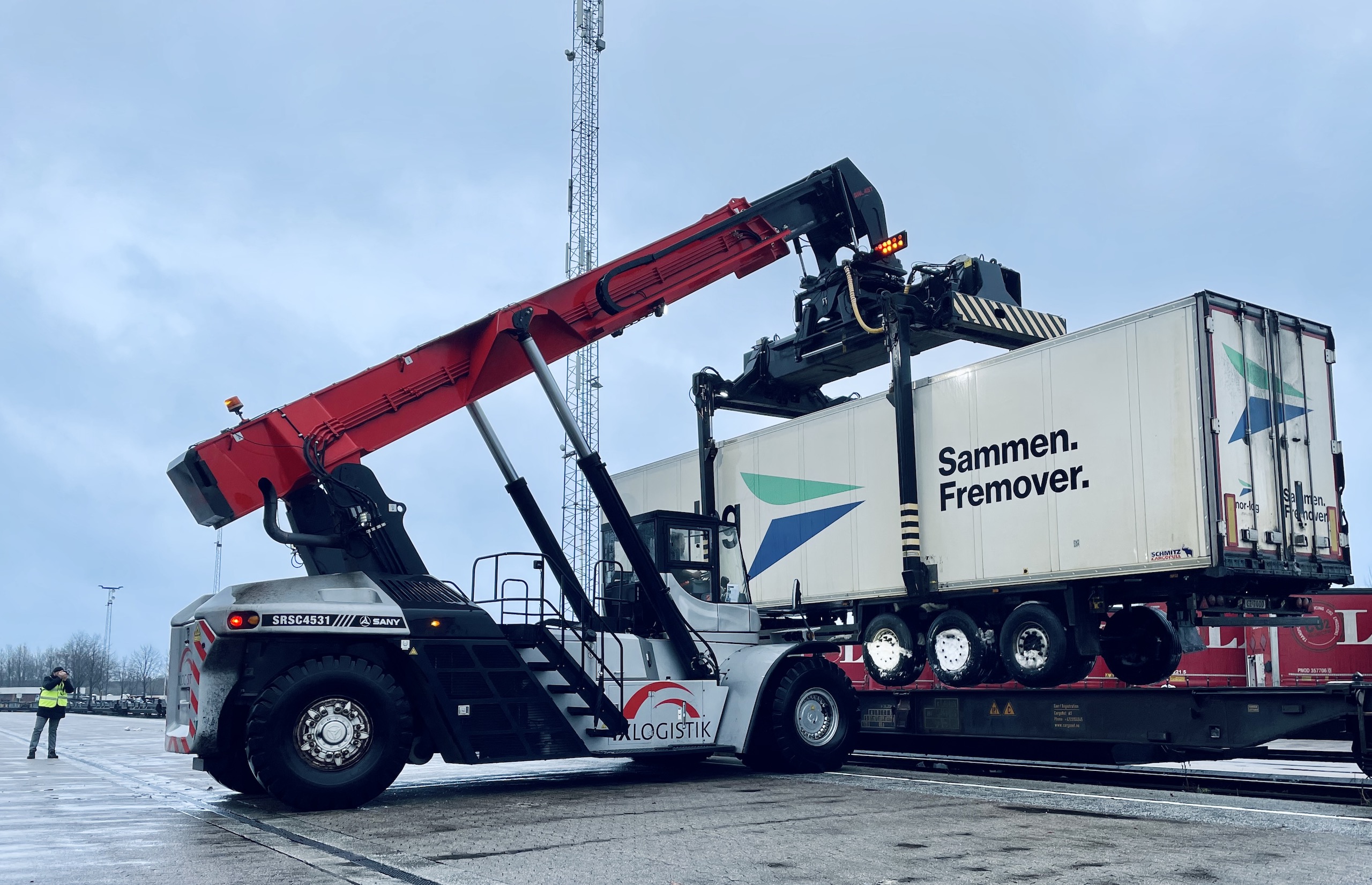At 9 o’clock on Friday night, the train set off from Narvik in northern Norway to Padborg on the German/Danish border, loaded with salmon.
In Narvik, 20 semi-trailers with salmon had been waiting for the first train to Padborg. This was the second attempt. The first time the salmon train attempted its maiden voyage, it was canceled due to train derailment at Kiruna.
“The absolute only thing that could go wrong went wrong at the time, but now everything is on schedule and the train will leave the terminal in Narvik at 21:00 tonight,” Nor-log Thermo general manager Erlend Pekeberg told SalmonBusiness earlier on the day.
The train changed at Malmö in Sweden at CargoNet’s depot where the all-electric locomotive was unhooked, and Deutsche Bahn took over the carriages. The salmon was hauled off to the town at the German border, for 12 o’clock on Sunday where Blue Water was waiting with 20 semi-trailers to deliver to the customers across Europe.
Three trains a week
“I’m very excited and think it’s nice to have finally started. We have been working on this for a long time in collaboration with CargoNet. This is an extension of the Malmö route we have had going on for over a year. We decided to extend the axis south to Padborg,” said Pekeberg.

From now on, there will be one train a week, every Friday night. The goal is three weekly departures from September 2022. With it, salmon from 60 semi-trailers are moved from road to track, travelling a stretch of more than 2,000 kilometers.
Pekeberg believes this comes in handy in a situation with in which there are major capacity problems caused by the shortage of HGV drivers.
“We will see how costs come out now in the future, but our plan is that this will be competitive in relation to today’s road transport,” said Erlend Pekeberg.
Guests of honor from the north
The salmon, who were the guests of honour on the first train journey to Padborg, has been booked by the exporters SalMar, Mowi, Norway Royal Salmon, Polar Quality, Coast, Grieg Seafood, Seaborn and Cermaq. Coast sends three lorries with salmon from Øyfisk, Kleiva Fiskefarm and Flakstadvåg Laks.
“Getting a direct transport past Oslo, which is not a natural stop, is important. Both time and price-wise, this is competitive, and that it helps to relieve an already blown terminal network in Eastern Norway is positive,” said Eirik Flo who is logistics director in Coast.

They had also booked three lorries in November when the first train was originally scheduled to leave, but did not lose heart over the train derailment in Kiruna, the northernmost town in Sweden, for that reason.
“We will focus on getting salmon on that train, I can say that right away. Especially when you get this up to three departures a week, at best every day, this is a full-fledged alternative to road transport,” he said.
Here, the salmon was loaded from road to track, and 2,000 kilometers had been covered by the time the train reached Padborg on Sunday morning.

“The trip has gone very well and without problems at all. The train arrived in Malmö one hour before the estimated time. There was some track work there, so a bit of a queue to get changed to a locomotive from Deutsche Bahn, but from there it went smoothly. This has been a successful test run,” said general manager Erlend Pekeberg on the phone from Padborg.

Excited exporters
A good deal of salmon will continue to Poland for filleting, but also some to the south in Europe. Nor-log was worried as to whether it would be possible to fill the train with enough salmon. They managed this on Friday in collaboration with eight Norwegian exporters, all of whom were kept updated by Pekeberg over the weekend.
“They are very happy that it went so well, and that you can perform in such an efficient way. We left Narvik at 21:00 on Friday, and are in Padborg at 14:00 on Sunday. Only trains can do that,” he said.
Nor-log will now evaluate the test trip to see what can be done differently, and get the exporters on board. Not least, they must secure enough equipment to complete this route in the future. The next trip is planned for Friday over New Year.
Need trolleys
“It has been tough to scrape together as much material as we have done to fill the train. Cars and trolleys are challenging to obtain, not least to get enough supplies north. The round trip for a trolley lasts for almost a week. It requires a lot of material for such an investment. We hope more group loaders will join the train, so that as many trolleys are needed as needed,” said Pekeberg.

CargoNet depends on having an almost full train before it becomes sustainable. The steep climb up Bjørnfjell means that the locomotive can only tow trolleys corresponding to a maximum of 20 semi-trailers with fish.
“We should have between 16 and 20 cars to get good utilization so that this becomes a future fixed route. The whitefish industry also thinks this is very interesting. They also have challenges in getting cars. The timing of a salmon train like this is now very positive,” concludes a rain-soaked and satisfied leader in Nor-log Thermo Erlend Pekeberg.



